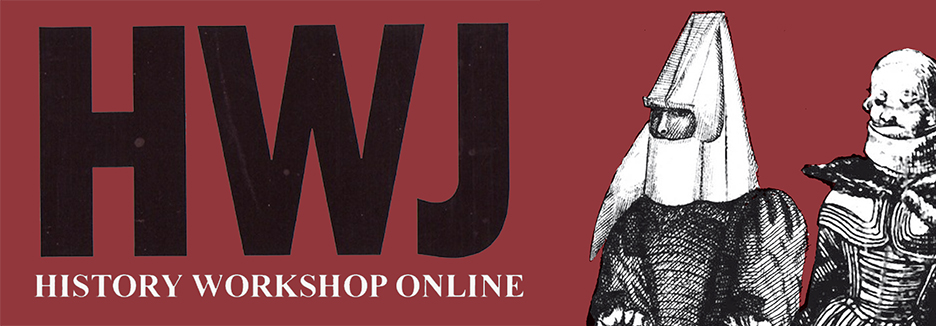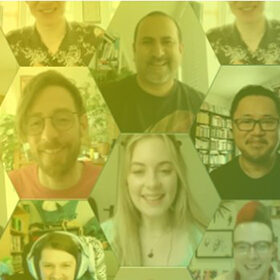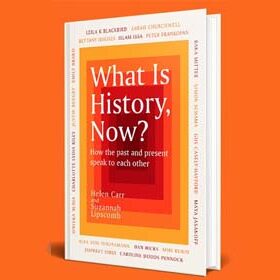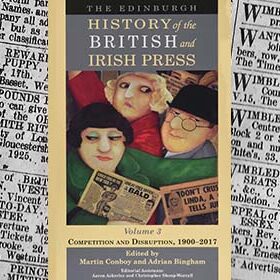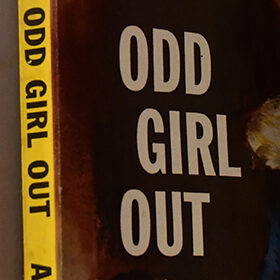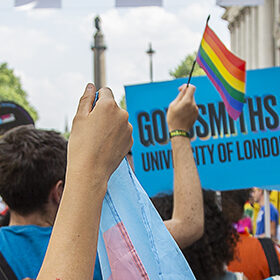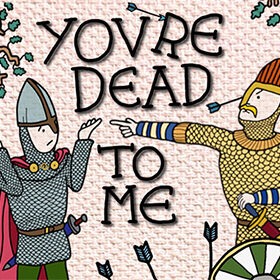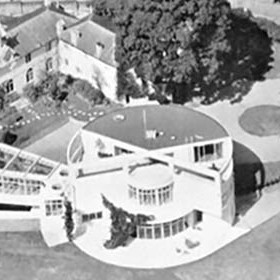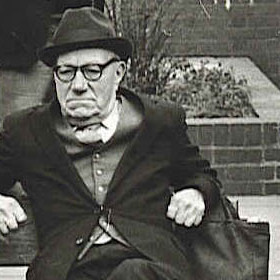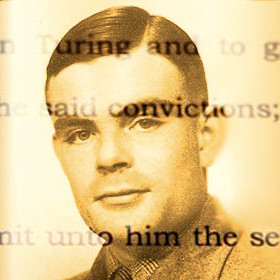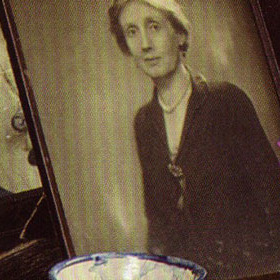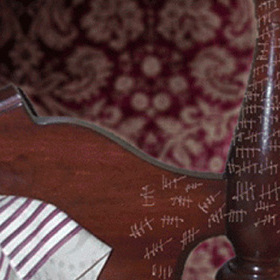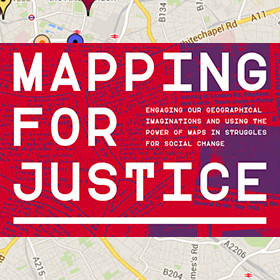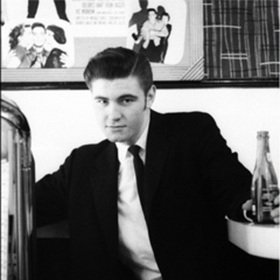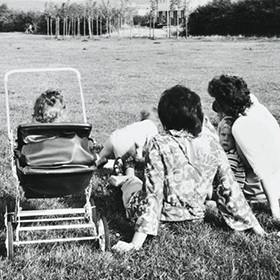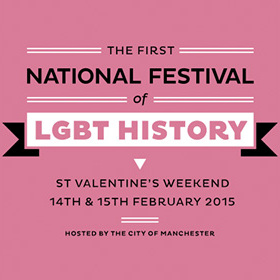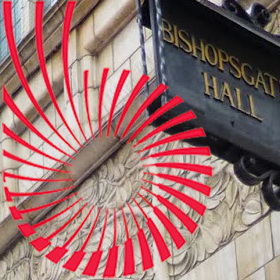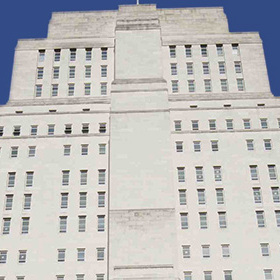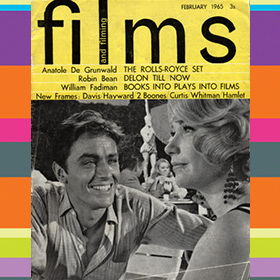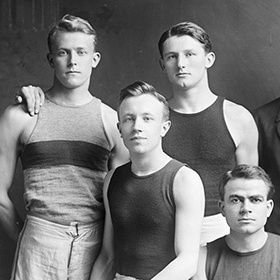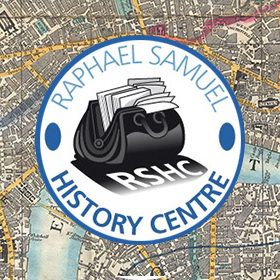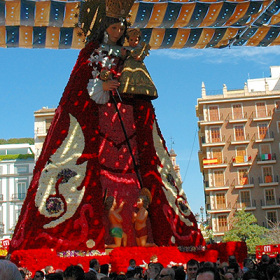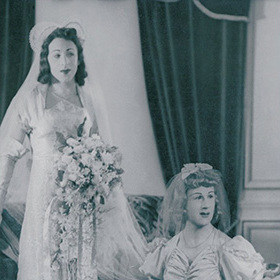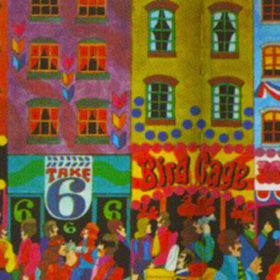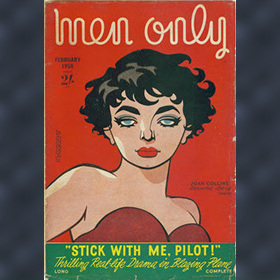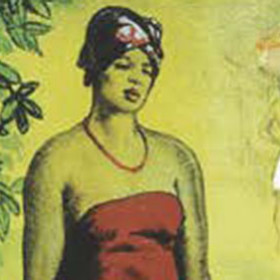St. Ann’s Court, Chertsey, Surrey
October, 2016 · By Justin Bengry
In October 2016, I was invited along with Alison Oram to be interviewed by the BBC at the 1937 Grade II* listed modernist mansion St. Ann’s Court.
St. Anne’s Court was built in 1937 by architect Raymond McGrath for stockbroker Gerald Schlesinger and his partner architect Christopher Tunnard. The LGBTQ heritage significance of St. Ann’s Court came to light during research for the Pride of Place project with Historic England. The circular master bedroom was designed in such a way that the double bed (in fact two beds pushed together) could be separated and then moved into side alcoves separated by curtains and screens. The central circular room then became a breakfast or dressing room. This ingenious solution allowed Schlesinger and Tunnard to maintain their privacy at a time when homosexual offences were punishable with imprisonment. It also shows how LGBTQ histories can be built into the very fabric of buildings.
As a result of our research, St. Anne’s Court was relisted to include its LGBTQ heritage significance.
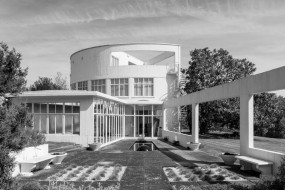 The House that Had a Forbidden Love
The House that Had a Forbidden Love
Date: 3 October 2016
Produced by Alexi Peristianis
On the day it was released, the video was one of the top hits on the BBC News website. It’s announcement on Facebook was viewed over 1.6 million times, reacted to 10,000 times, and shared over 2,500 times.
Forgetting the Many: The Royal Pardon of Alan Turing
November, 2015 · By Justin Bengry
In 2015 I was interviewed by Rosemarie Reed at Films for Thought’s feature documentary Forgetting the Many. In the wake of mathematician and WWII codebreaker Alan Turing’s posthumous royal pardon for homosexual offences committed in 1952, the film asks when other men will have their convictions for historic offences erased or pardoned.
From Films for Thought:
The 2014 film The Imitation Game tells the story of Alan Turing, the homosexual British mathematician/codebreaker whose WWII solution to the Nazi Enigma encryptions arguably won the war. His country repaid him by convicting him in 1952 of “gross indecency” under Section 11 of the Criminal Amendment Act of 1885 and sentencing him to chemical castration, with painful and disfiguring results; in 1954, he killed himself. In 2009 he received an apology from Prime Minister Gordon Brown and, in 2013, he received a posthumous, if belated, Royal Pardon from Queen Elizabeth II.
But Turing was hardly the only victim of Section 11.The Imitation Game refers briefly to the other 49,000 men who were convicted and imprisoned for the same “crime” and never received even an apology, let alone a pardon. Their convictions stand. As many as 15,000 of them are still alive, still on the margins of society, their lives destroyed because their illegal sexuality brought them to public toilets, bars, and back alleys to find partners. Now they (or in some cases, their families) are seeking an apology from their government for criminalizing their sexuality, and a pardon to expunge their criminal records.
Forgetting the Many is their story.
NOTCHES: (re)marks on the history of sexuality
June, 2015 · By Justin Bengry
NOTCHES is an international, collaborative public history blog that I co-founded in order to get people inside and outside the academy thinking about sex and sexualities in the past and in the present.
The NOTCHES blog is accessible, inclusive, relevant, entertaining and intellectually engaged. Our international team of bloggers considers the history of sex and sexuality in its broadest sense: the way it is connected to the history of gender, society, politics, economies, and cultures, and the way it informs current issues. NOTCHES posts have been republished at the Huffington Post, Slate, The Boston Globe, and translated for publication around the world. NOTCHES’ more than 300 posts have been over a million times. To read more and to follow NOTCHES, visit us at NotchesBlog.com
If you are interested in contributing to NOTCHES, please email us at NotchesBlog@gmail.com
Blogging and Social Media
July, 2014 · By Justin Bengry
I am active on social media and digital platforms blogging on the themes of higher education, history and sexuality.
I have written guest blogs for organisations including the School of Advanced Study, University of London; the Bishopsgate Institute, London; the History News Network at George Mason University and others. My own research blogs have been republished at the Huffington Post, The Politics and Policy Blog at the London School of Economics, and Slate. I have also been featured at the BBC Radio 4’s You’re Dead to Me and interviewed about my work in for Podcast Episode 49 at ActiveHistory.ca, an initiative that connects the work of historians with the wider public and the importance of the past to current events.
Blogging:
Launched in January 2014, NOTCHES: (re)marks on the history of sexuality soon became a leading global voice in the history of sexuality on both sides of the Atlantic. An international, collaborative, open-access blog, NOTCHES’ more than 300 posts have been achieved over a million views. NOTCHES is at the centre of international conversations about the history of sexuality in the academy and beyond.

Having been an Editorial Fellow, I am now on the Advisory Board of History Workshop Online (HWO), the online magazine for History Workshop Journal, which seeks to continue the spirit of the History Workshop movement. As Editorial Fellow I was responsible for commissioning and editing content, social media and promotion, and contributing to planning and strategy for HWO. This has included overhauling the online presence of of one of the most important historical movements of the twentieth century.
In 2009 I was invited to participate in the Blackwell-Wiley sponsored ‘History Compass Exchanges’ blog. Contributions ran the gamut from interviews with scholars and questions of method and practice for professional historians to personal anecdotes and updates as I navigated my way through postdoctoral life. With a large and active readership, the History Compass site offered an opportunity to engage with academics and an engaged public on questions of teaching methods, writing strategies and professional development. History Compass no longer exists, but I have archived my past blogs on this site.

I was an early contributor to the Canadian youth and careers website TalentEgg as a writer throughout 2010 for their Career Incubator series. I wrote about young professionals and higher education, but most of my blogs comprised advice to students on transitioning into and thriving at graduate school.
Twitter:
In addition to my own personal @JustinBengry twitter profile, which has over 10,000 followers, I manage and contribute to the @NotchesBlog account, which supports the activities of NOTCHES: (re)marks on the history of sexuality. I am also the Social Media Coordinator for the History of Sexuality Seminar at the Institute of Historical Research, and operate its @IHR_Sexuality twitter account and Facebook presence, which together promote activities of the seminar and act as a notice board for activities and events in the field. I have also managed social media for several historical projects including the AHRC-funded project Queer Beyond London tweeting from @QueerBeyondLDN and also Historic England’s initiative Pride of Place: England’s LGBTQ Heritage from @LGBTQPlaces and our own hashtag #PrideofPlace.
Other Social Media:
My full academic profile can be viewed at Academia.edu.
I have compiled my online writings into a blog archive.
Bisexuality: a documentary film
April, 2013 · By Justin Bengry
The documentary film ‘Bisexuality’ explores how bisexuals are seen and perceived in modern society.
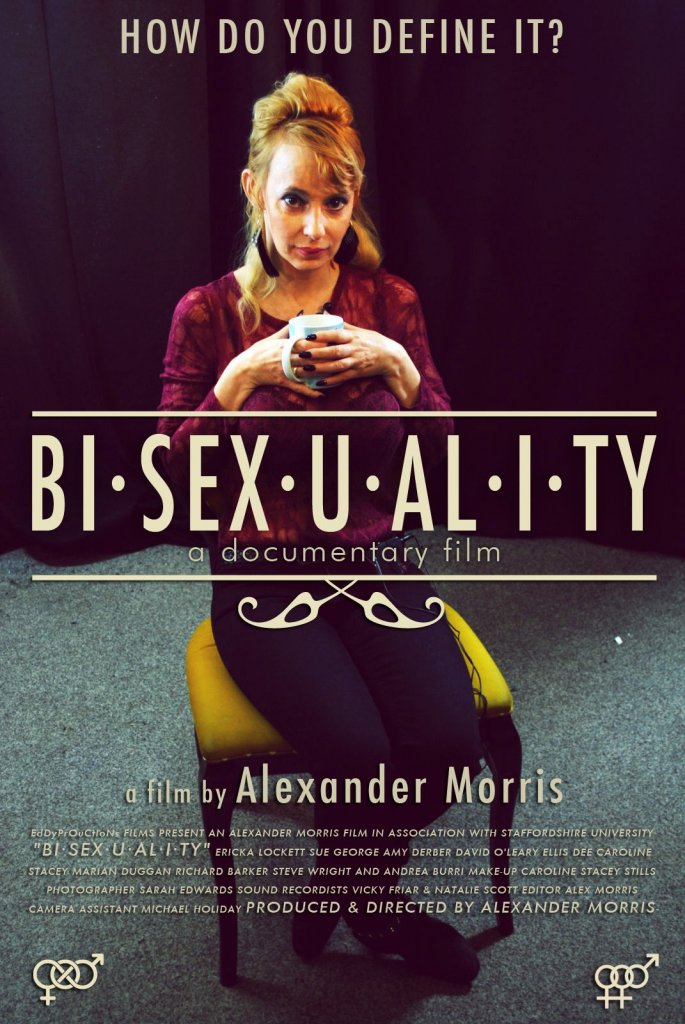 I was approached by film-maker Alex Morris in 2012 to be interviewed for his documentary ‘Bisexuality‘. It follows a selection of bisexual, straight and gay men and women whose experiences are told through the eyes of the film-maker. My role was to talk about perceptions of bisexuality in a historical perspective, comparing it to how scholars understand histories of male homosexuality and lesbianism. But I also spoke about my own perceptions of bisexuality in the contemporary world, how bisexuals were understood by gay men, and misconceptions they faced.
I was approached by film-maker Alex Morris in 2012 to be interviewed for his documentary ‘Bisexuality‘. It follows a selection of bisexual, straight and gay men and women whose experiences are told through the eyes of the film-maker. My role was to talk about perceptions of bisexuality in a historical perspective, comparing it to how scholars understand histories of male homosexuality and lesbianism. But I also spoke about my own perceptions of bisexuality in the contemporary world, how bisexuals were understood by gay men, and misconceptions they faced.
Morris’s film has been screened to a number of private and public bodies including local councils and at the UK Parliament.

